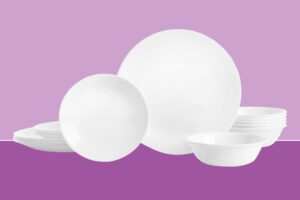
AlexandrMusuc/Shutterstock
Magnesium has become increasingly popular as a supplement to help you relax before sleep. While you can get plenty of magnesium by eating more nuts, whole grains, leafy greens, and dairy, the Sleep Foundation says more than half of people in the United States fall short of their recommended daily needs. A magnesium supplement may also improve your exercise performance, mood, and bone health.
Magnesium supplements may not be for everyone, especially if you take certain medications. If you take the thyroid medication levothyroxine, you should avoid taking magnesium at the same time. Magnesium makes it more difficult for your body to absorb levothyroxine, which means you could experience problems with the functioning of your thyroid. Keep watch for thyroid symptoms such as fatigue, depression, weight gain, or aching joints.
This doesn’t mean you should avoid magnesium supplements altogether. According to Drugs.com, you should wait at least four hours after taking your thyroid medication before taking magnesium. If you take your medication in the morning, it may be better to take your magnesium supplement in the evening or after lunch.
Levothyroxine must be taken on an empty stomach

Jlco – Julia Amaral/Getty Images
If you’ve been prescribed levothyroxine, you probably know that it’s best taken on an empty stomach. That’s because your small intestine absorbs the synthetic T4 hormone most efficiently when there’s nothing else in the way. When taken correctly, levothyroxine reaches peak levels in your bloodstream within about two hours, according to a 2019 article in Endocrine Reviews.
For many, that means taking it first thing in the morning and waiting at least 30 minutes before breakfast. But if mornings are hectic, you might consider taking it at night. You’ll need to wait at least three hours after dinner. If you take levothyroxine sooner than that, you could see your thyroid levels fluctuate.
Some magnesium supplements can actually make your stomach more alkaline, which isn’t ideal for levothyroxine absorption. This drug thrives in a more acidic environment, so magnesium could interfere with how well your body processes it. Magnesium isn’t the only supplement to avoid. Calcium and iron supplements, even those in a multivitamin, can also compete for absorption. Foods like soybean flour, cottonseed meal, walnuts, and high-fiber options can bind to levothyroxine, leaving less of the drug available for your body to use.
Other interactions with magnesium and levothyroxine

Ridofranz/Getty Images
Any time you add an additional drug or supplement, there is a risk that one will affect the other. Both drugs and supplements often follow the same routes in their absorption, metabolism, and elimination. As you add vitamins, minerals, herbal formulas, and greens powders to your supplement regimen, it’s a good idea to check how these healthy additives may block the absorption of your current medications.
Levothyroxine has 219 moderate drug interactions, including supplements such as ashwagandha, St. John’s wort, and extracts to treat allergies. Pseudoephedrine, which is found in many nasal decongestants, may cause chest pain, heart palpitations, or high blood pressure if you’re also taking levothyroxine (per Drugs.com). Antacids, bile acid sequestrants, ion exchange resins, and proton pump inhibitors can all reduce the absorption of levothyroxine in your body (per GoodRx).
According to Drugs.com, magnesium citrate supplements have major interactions with three medications. The HIV/AIDS drugs cabotegravir and dolutegravir can have trouble being absorbed by your body if you take them within a few hours of a magnesium supplement. If you’re taking the bladder cancer drug erdafitinib, magnesium supplements may increase the phosphate levels in your blood. Here are some other medications that may interact with your magnesium supplement.
Credit: healthdigest.com






